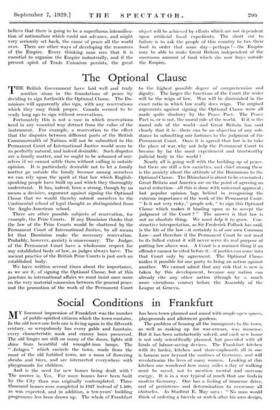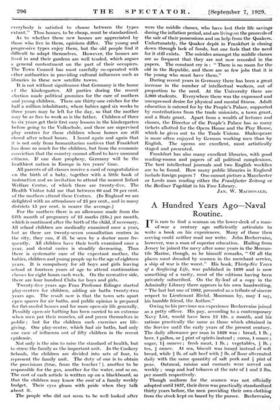Social Conditions in Frankfurt
MY foremost impression of Frankfurt was the number of public-spirited citizens which the town contains. In the old town one feels one is living again in the fifteenth century, so scrupulously has every gable and fountain, every characteristic nook and cranny been preserved. The old hinges are still on many of the doors, lights still shine from beautiful old wrought-iron lamps. The " Anlagen " which encircle the town, made from the moat of the old fortified town, are a mass of flowering shrubs and trees, and are intersected everywhere with playgrounds for children.
And is the need for new homes being dealt with ? The answer is, Yes. Far more houses have been built by the City than was originally contemplated. Three thousand houses were completed in 1927 instead of 1,400, as was expected, and in addition, a ten-years' building programme has been drawn up. The whole of Frankfurt has been town-planned and zoned with ample open spaces, playgrounds and allotment gardens.
The problem of housing all the immigrants to the town, as well as making up for war-arrears, was immense. But it has been satisfactorily solved, and each new house is not only scientifically planned, but provided with all kinds of labour-saving devices. The Frankfurt kitchen with its larder, kitchen and store-cupboards all in one is famous now beyond the confines of Germany, and will revolutionize the lives of many women. Looking at this kitchen one wondered how many miles a day of walking must be saved, not to mention mental and nervous energy. It is in a way typical of much that one finds in modern Germany. One has a feeling of immense drive, and of persistence and determination to overcome all obstacles. As Stadtrat E. May says : " No man would think of ordering a bievele or watch after his own design, everybody is satisfied to choose between the types extant:" Thus houses, to be cheap, must be standardized.
As to whether these new houses are appreciated by those who live in them, opinions differ. The young and progressive types enjoy them, but the old people find it difficult to adapt themselves. However, the houses are lived in and their gardens are well tended, which argues a general contentment on the part of their occupiers. The Town Council has most carefully co-operated with other authorities in providing cultural influences such as libraries in these new satellite towns.
It is not without significance that Germany is the home c f the kindergarten. All parties during the recent election made political promises for the care of mothers and young children. There are thirty-one creches for the half a million inhabitants, where babies aged six weeks to three years may be left for the day, so that the mother may be as free to work as is the father. Children of three to six years get their first easy lessons in the kindergarten before going to the Volkschule, and there are supervised play centres for those children whose homes are still closed after school hours. I heard again and again that it is not only from humanitarian motives that Frankfurt has done so much for the children, but from the economic conviction that the country cannot afford to have unsound citizens. If one dare prophesy, Germany will be the healthiest nation in Europe in ten years' time.
All parents of all classes receive a card of congratulation en the birth of a baby, together with a little book of instruction and an invitation to attend the nearest Infant Welfare Centre, of which there are twenty-five. The Health Visitor told me that between 60 and 70 per cent. of the mothers attend these Centres. (In England we are delighted with an attendance of 25 per cent., and in many districts 15 per cent. is nearer the average.) For the mothers there is an allowance made from the fifth month of pregnancy of 25 marks (25s.) per month, which is continued after the birth of the child, if necessary. All school children are medically examined once a year, but as there are twenty-seven consultation centres in the city, they can, if ill, be seen by a doctor more fre- quently. All children have their teeth examined once a year, and dental caries is steadily decreasing. Thus there is systematic care of the expectant mother, the babies, children and young people up to the age of eighteen years. It is compulsory for all boys and girls leaving school at fourteen years of age to attend continuation classes for eight hours each week. On the recreative side, there are four hundred Clubs for boys and girls.
Twenty-five years ago Frau Professor Edinger started play-centres for children, adding air baths twenty-two years ago. The result now is that the town sets apart open spaces for air baths, and public opinion is prepared for flat-roofed houses and for more open-air life generally. Possibly open-air bathing has been carried to an extreme when men pat their muscles, oil and preen themselves in public ; but for the children such exercises are life- giving. One play-centre, which had air baths, had only one case of influenza out of fifty children in the recent epidemic.
Not only is the aim to raise the standard of health, but to stress the family as the important unit. In the Cookery Schools, the children are divided into sets of four, to represent the family unit. The duty of one is to obtain the provisions (true, from the teacher ! ), another to be responsible for the gas, another for the water, and so on. The cost of each article is written up on a blackboard, so that the children may know the cost"of a family weekly budget. Their eyes gleam with pride when- they talk about it.
The people who did not seem to be well looked after were the middle classes, who have lost their life savings during the inflation period, and are living on the proceeds of the sale of their possessions and on help from the Quakers. , Unfortunately, the Quaker depot in Frankfurt is closing down through lack of funds, but one feels that the-seed. for it still exists. The suicides amongst the middle classes are so frequent that they are not now recorded in the papers. The constant cry is : " There is no room for the old in the Republic, and there are so few jobs that it is the young who must have them."
During recent years in Germany there has been a great increase in the number of intellectual workers, out of proportion to the need. At the University there are 5,000 students. Everywhere there was the expressed and unexpressed desire for physical and mental fitness. Adult education is catered for by the People's Palace, supported by contributions from the trade unionists, a town grant, and a State grant. Apart from a wealth of lectures and classes, the Director of the People's Palace has so many tickets allotted for the Opera House and the Play House, which he gives out to the Trade Unions. Shakespeare is more often enjoyed by German working men than by English. The operas are excellent, most artistically staged and presented.
Frankfurt has also many excellent libraries, with good reading-rooms and papers of all political complexions. The best intellectual journals and two English weeklies are to be found. How many public libraries in England include foreign papers ? One cannot picture a Manchester or Leeds man reading either the Frankfurter Zeitung or the Berliner Tageblatt in his Free Library.
JAN. W. MACDONALD.

































 Previous page
Previous page